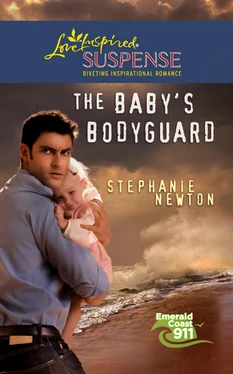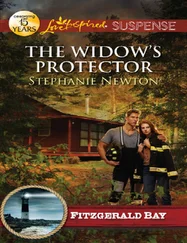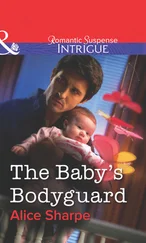“Did you just see an empty boat floating in the middle of the ocean with the little girl in it?” Kelsey asked Ethan as she held the toddler close.
Ethan pulled out diapers and an extra outfit, very well-worn. Then he pulled out a card with a small handprint on it. He laid it on the table and stared at it.
“Ethan?”
“An … n?. I didn’t just find her. Someone sent me to the boat.” His hands shook as he stared at a picture of an infant around six months old-and not of the little one Kelsey held.
“Ethan, who is that?” She gentled her voice. It was obvious the picture meant something to him.
He shook his head, his eyes on the photo.
Kelsey put her free hand over his, blocking his view. “Ethan, look at me. Who is the baby in the picture?”
He swallowed hard, his eyes dark with pain. “That picture is my son, Charlie. It was taken right before he died.”
What was going on? Why would someone use this toddler to get to Ethan?
The Baby’s Bodyguard
Stephanie Newton

www.millsandboon.co.uk
Dear Reader,
When I started The Baby’s Bodyguard, I knew the basics. I knew that Kelsey and Ethan had both suffered a terrible loss, and that they both had some lessons to learn along the way to love.
I didn’t know that human trafficking is a huge and growing problem worldwide, including in the United States. The suspense in this story is fictional, but the truth is that children are bought and sold as commodities every day.
Here’s another truth: Love wins in the end. It’s the happily ever after that we all seek.
For more information or to contact me, please go to www.stephanienewtonbooks.com. I’d love to hear from you.
Blessings,

For Riley, who has the heart of a hero
I will turn their mourning into joy and will
comfort them and give them joy for their sorrow.
— Jeremiah 31:1
Seven months of deep cover had led to this exact moment. The meet he’d been angling for since he’d hooked up with Antonio Cantori all those months ago. A direct line to the man who was pulling the strings behind a group of businessmen. Businessmen who bought and sold millions of dollars a week. And their sideline moneymaker—human trafficking, specifically little girls.
Ethan Clark picked up the satchel of money from the passenger side of his Jaguar sedan and looped it over his head. Once the money changed hands, he was done. A team of field agents would swarm the plush office behind the restaurant and take down the man pulling the strings. And Ethan could go home to his wife and baby.
The stakes were high, had never been higher. This was his last undercover assignment. He’d told his superiors at the FBI that he couldn’t do this kind of operation any more. And the lives of those little girls were on the line, too. He’d held the weight of it in his heart for four long months, knowing he was powerless to save them.
But tonight was the night he changed things.
Ethan straightened his two-hundred-dollar tie and rounded the corner, pausing just for a minute to check out the gleaming windows of the Ristorante Giorgio, Cantori’s place. His blood thrummed through his system. Adrenaline. Excitement.
A blonde pushing a baby stroller eased into view, walking toward the restaurant. He hesitated. She moved like his wife—like Amy—but it wouldn’t be Amy. She didn’t live in this town, didn’t even know this place was on the map. He took a step closer. She stopped under a streetlamp, looked at her watch.
His wife. His baby.
Here?
Another step. She opened the door of the restaurant. She shouldn’t be here. Shouldn’t be anywhere close to here. But if he called out to her, his cover was blown and they were all dead. Amy, baby Charlie, and him.
The explosion slammed him against the building behind him. And when he opened his eyes, Amy was gone. The restaurant was a gaping, burning cave.
His mouth dropped open in a silent scream, his throat closing up on him so fast, he could barely whisper her name.
Sirens wailed and every car alarm in ten blocks blared.
“Amy.”
Tony Cantori walked out of the wall of flames toward a vehicle waiting on the corner. His black eyes searched the block, passed Ethan and came back. He shaped his fingers into the sign of a handgun and made the motion of pulling the trigger at Ethan. Laughing, he jumped into a black van, which slid smoothly away from the curb.
Ethan ran for the restaurant, dropping the bag of money on the sidewalk. “Amy!”
He pushed through the crowd of people that had begun to gather outside. “Amy!”
Rough hands grabbed him, holding him back. He fought them. “I’ve got to get—my wife, my—”
New hands held his face. His partner, Bridges, made him hold eye contact. “You can’t go in there.”
Ethan bucked against the arms holding him back. His legs were restricted, but he surged forward, screaming. “Amy!”
Bridges grabbed him the way he would a child and held him. “It’s no good, Ethan. They’re gone.”
His throat worked, tears locked against a wall of pain.
No.
Two years later
Ethan Clark had always preferred the gentle slap of water on a fishing boat to the raucous houseful of boys that he’d grown up in. He still had that old wooden fishing boat he’d inherited from his grandpa, but these days his ride was a dual-outboard powerboat fitted with blue lights.
Policing Florida’s waterways kept Ethan Clark out of his house. Away from the memories. Away from concerned friends and relatives, from walls painted with cars and trucks—a room his little boy would never again sleep in.
His cell phone buzzed in his uniform pocket. He started to reach for it, but hesitated, his fingers curling into a fist. He’d been getting text messages for the last two weeks. Close-ups of a baby—a tiny foot, the curve of a cheek, a little hand, chubby and creased.
He had a trace put on the number, but it was untraceable—a throwaway cell phone. He slowed the boat to a troll, barely making waves, and opened his phone. This time it wasn’t a photo. It was geographical coordinates.
Ethan keyed the numbers into his onboard navigating system. It was his job to know the ocean well—and as the map popped up, he recognized this spot. Shallows about four miles out, half an hour from his location.
If the FWC—Florida’s Fish and Wildlife service—had a plane in the area, they could scope it out from the air. He called in the coordinates and asked for aerial backup, really the only kind available on short notice out here.
He gunned the big engines on his boat, sending it plowing through the waves. Every stop, even the routine ones, had the potential for danger. A situation like this had all the earmarks of an ambush.
The radio squawked. “Marine Four, this is Eagle Two-ten. We’ve got eyes on that location. Looks like an abandoned boat. Over.”
“Copy that, Eagle Two-ten. Thanks for the look-see. Over.” Abandoned could mean a lot of things. Engine problems. Drugs. Crime scene.
Considering the text message directly to him, it definitely could mean the boat was set as some kind of trap. He had a lot of enemies from his time spent in the FBI. The fact that he’d laid low in the years since didn’t mean squat. Some of those guys had extremely long memories.
Читать дальше














